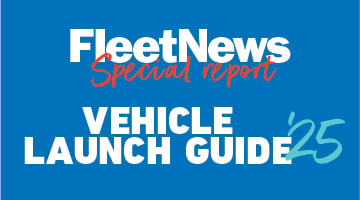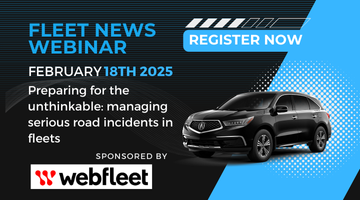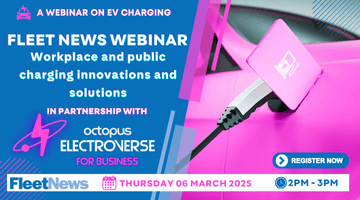A target of zero accidents has been set by Enterprise Managed Services, one of the UK’s largest employers which has already cut vehicle-related road incident claims by almost £500,000.
The savings, which amount to a 12% reduction in overall claims costs and a 13% (more than £100) reduction in costs per vehicle follow Enterprise’s increased focus on at-work driving safety with the launch of its Road Risk Steering Committee (RRSC).
The RRSC, which was introduced in 2009, set an initial target of a 15% reduction in vehicle-related incidents across Enterprise’s area of operations with the implementation of a wide range of measures. Some initiatives such as improved incident reporting and investigation are already reaping rewards while others, such as the introduction of telematics systems and the fitment of more vehicle speed limiters, have still to be introduced.
It is that comprehensive programme of occupational road risk management, which involves all the company’s 13,000 employees working across 170 sites in the UK, that has seen Enterprise join the Driving for Better Business campaign as a business champion.
Enterprise is the UK’s largest dedicated maintenance service provider to the public sector and utility industry. It operates a fleet of more than 5,500 vehicles including around 4,000 commercial vehicles, 1,230 company cars and more than 400 special duty vehicles such as refuse vehicles. Additionally, a number of privately owned vehicles are driven on company business.
On joining the RoadSafe-managed campaign, Alison Moriarty, Enterprise’s health and safety manager, said, “We are delighted that the measures we have already taken to protect our employees and all other road users have been recognised in this way. Most of our 13,000 employees drive as part of their work role or in a private capacity.
“Enterprise believes that the most important lesson to be learned from its experience in managing the safety of employees who drive for work, is that it is vital not to look at road safety in isolation from the way the company manages other health and safety issues.
“There must be a holistic approach to safe systems of work and a vehicle must be looked at in the same way as any other workplace.
“Most companies place a high priority on the health and safety of their employees and most will have robust systems and procedures already in place to manage them. It makes sense, therefore, to use this existing framework to develop road safety management systems.”
There are an estimated up to 150 road deaths and serious injuries a week resulting from crashes involving at work drivers, and more employees are killed and seriously injured on Britain’s roads while driving on behalf of their employer than in any other work-related activity.
Enterprise’s Target Zero initiative encourages employees to avoid unsafe acts and unsafe conditions - rule breaking and violations - which are the triggers which ultimately give rise to accidents and incidents within the workplace. But it also supports them in achieving the aim through a variety of policies and procedures.
In terms of road safety they include:
- A drivers’ handbook which is given to all employees who drive company vehicle. It is mandatory that staff sign a declaration to confirm that they have read and understood the information it contains.
- A major communications programme to raise road safety awareness to gain reductions in the numbers of accidents including toolbox talks, driver induction programmes and safety alerts on key issues.
- Detailed driver licence and eyesight checks on all drivers are carried out, including on staff who only drive occasionally, alongside vehicle checks.
One of the first tasks of the RRSC was to improve the recording of vehicle-related incidents to the firm’s Customer Response Centre. A ‘Bump Pack’ was introduced to encourage employees to report all incidents and to make it easy for them so to do. In addition, it provides a simple, clear and easy executable check list to assist a driver identify the causes, results; actions and information required to report and record an incident.
Supporting the ‘Bump Pack’ is a process called Line Manager Accident Debrief, which requires a driver to report any incident to their line manager as soon as possible and within 24 hours. Line managers complete an initial debrief with the driver within two days.
The improved reporting and analysing of incidents has enabled Enterprise to introduce campaigns targeted at where the majority of accidents are occurring.
Meanwhile, the incident debrief process has resulted in improved driver behaviour with targeted training also introduced.
Additionally Enterprise has decided to fit speed limiters to more vehicles and to equip vehicles with telematics systems which will aid the monitoring of employees driving hours.
Moriarty added, “Although there has been a small increase in the accident frequency rate, which was anticipated as a result of the introduction of the ‘Bump Pack’, Enterprise has made financial savings because of the way in which it manages and deals with accidents.
“These savings have given Enterprise the opportunity to fund some of the improvements we are planning this year including the fitting of telematics systems.
“In addition, Enterprise is working closely with its insurers (Aviva) and its risk brokers (Marsh) with a view to reducing its annual insurance premium on the basis of the way in which it manages its road risk.”
A key objective of Target Zero is to be proactive by preventing accidents and incidents occurring within the workplace, rather than reactive to their occurrence. Crucially, therefore, Target Zero encourages the participation of all staff which includes a depot-based Worker Involvement in Safety and Health (WISH) Suggestion Scheme
Moriarty said, “Enterprise recognised that unless it provided employees with the tools to control the risks associated with its diverse operations effectively, the management would not be able to prevent accidents and incidents. Target Zero therefore covers all aspects of Enterprise’s activities, including driving.
“Enterprise believes that the costs of being proactive are significantly less than those of dealing with accidents and incidents once they occurred. In addition, it was better not to have to correct the factors that gave rise to an employee or member of the public being injured and deal with the associated costs of doing this, both from a business point of view and from a publicity perspective.
Michael Parish, co-director of the Driving for Better Business campaign, said, “Enterprise has made huge strides in recent years to raise awareness of the importance of safe driving across the organisation.
“With the company being such a high profile organisation I am confident that the commitment it has made to encouraging safe driving through its various initiatives will give a major impetus to the campaign and encourage other like-minded organisations to follow its lead.”

















Login to comment
Comments
No comments have been made yet.